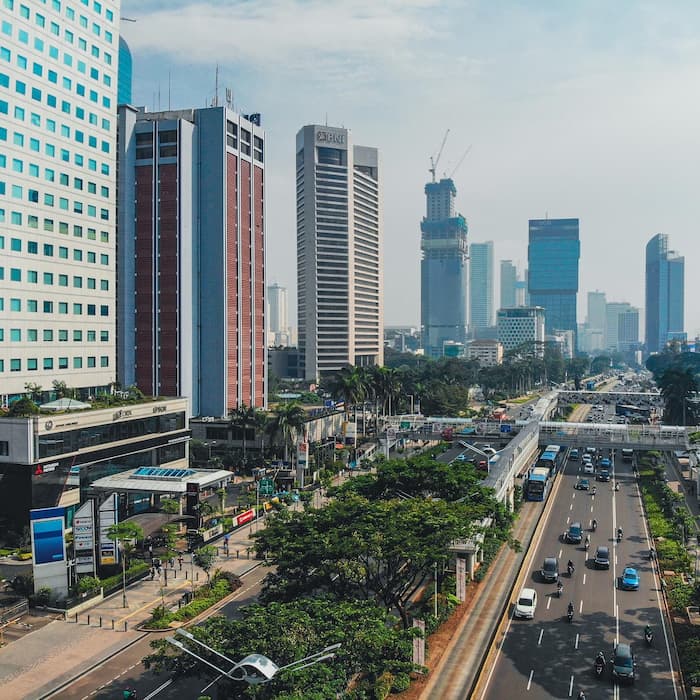Emerging Markets
Crux Asset Management Eyes Indonesian Promise

The archipelago of Indonesia is home to 272.5 million people and
its young demographics, rich natural resources, and a population
eager to become prosperous are attractive attributes to
investors, whatever near-term challenges exist.
All those attractions have persuaded Ewan Markson-Brown, fund
manager, of Crux Asset
Management, a London-based asset manager, to consider the
area. Markson-Brown has an overweight weighting in Indonesia in
his Asia strategy. This is partly due to hot commodity prices and
other forces, for example: Indonesia is becoming more politically
stable; debt is manageable; and foreign direct investment is
moving in.
Markets are opening after the pandemic, Markson-Brown told this
news service in a recent article.
Crux AM has work to do in improving performance of the Crux Asia
ex-Japan Fund, a £125.3 million ($151.5 million)
Luxembourg-structured SICAV. According to its June factsheet, the
fund (in sterling) fell 21.5 per cent in the 12 months to 30
June, while the MSCI Asia ex-Japan Index (sterling) dropped 7.9
per cent. Exposure to China hasn’t helped: the country’s equities
account for 38.6 per cent of all holdings, with Indonesia in
second place at 14.6 per cent, and South Korea at 11.9 per cent;
India at 11.7 per cent; Taiwan at 6.9 per cent; and Hong Kong at
5.8 per cent. The biggest sector in the fund is materials (17 per
cent), followed by automobiles and components (11.2 per cent).
"The Crux Asia ex-Japan Fund’s performance was adversely affected by being overweight growth stocks and hit by the recession, which hurt the fund’s commodity exposure in particular. However, we still strongly believe in our long-term investment theme of the electrification of things, in particular the growth of electric vehicles and, as a result, we have increased our EV exposure by going overweight in Indonesia and more recently China," Markson-Brown said.
Until this time last year Markson-Brown ran the China and south-east investing activities of Ballie Gifford.
Ups and downs
“Asian emerging markets are risky, and my goal is to outperform
on a rolling five-year basis. We are not here to protect on the
downside,” Markson-Brown said.
Indonesia’s fortunes have waxed and waned. The country’s economy
was hit hard in the 1997-1998 financial crisis that hit other
Asia countries; there was a recovery phase, aided by a boom to
commodities (2002-2013). The market in the country peaked around
2012-2013.
“We spent about seven years going nowhere till late 2020,”
Markson-Brown said.
“Post-Covid, something has changed, and we are at the start of
another bull cycle that could last five to 10 years,” he
continued.
So what are reasons for giving Indonesian investment
love?
Markson-Brown said Indonesia is the most populous of any of the
ASEAN group economies of Southeast Asia and was a natural draw
for foreign direct investment. (The other ASEAN countries are
Brunei, Cambodia, Laos, Malaysia, Myanmar,
the Philippines, Singapore, Thailand and
Vietnam.)
Reforms of state-owned enterprises and a more welcoming stance to
foreign capital are positive forces at work, he said.
Other positive factors are Indonesia’s large deposits of copper,
ferrous metals and oil – important resources when energy prices
are skyrocketing.
New technologies are also changing the narrative in this country,
which has contended with price rise pressures in the past.
“In the past it has been an inflationary country. The
deflationary effects of e-commerce have only started to come to
Indonesia,” Markson-Brown said. “E-commerce is breaking up
established firms and starting new forms of price
competition.”
What’s in the basket?
Out of a total of 91 holdings, the fund holds Indonesian or
Indonesia-exposed names such as Cisarua Mountain Dairy, Jadestone
Energy, Nickel Mines (it has bought big stakes in the
country’s mining industry), and Merdeka Copper Gold.
Global forces, such as the transition to electric vehicles, play
to Indonesia’s resource strengths, Markson-Brown said.
“We are thinking Indonesia is going to be a global hub for making
batteries….it has the nickel and the copper…they can be the
cheapest producer in high-grade batteries,” he said.
And there is the simple fact that rising economies can wring more
returns by applying technology than mature markets can. Indonesia
is no exception, Markson-Brown said.
“Emerging markets get a much higher productivity benefit from new
technology than is the case with developed countries…E-commerce
also works much better than when you don’t have sunk costs.”
Of all the other Southeast Asian countries, Vietnam is the most
similar to Indonesia. Markson-Brown added that he has an
overweight stance to Vietnam, if not as pronounced as for
Indonesia.
However, there are certain areas which are off-limits. "We
wouldn't buy the tobacco stocks (ex growth) and would be wary of
palm oil,” Markson-Brown added.